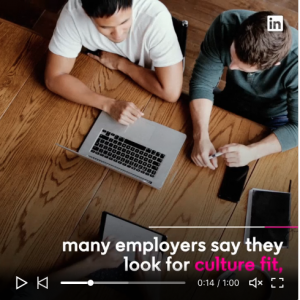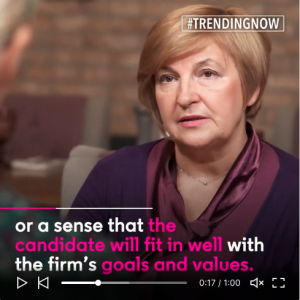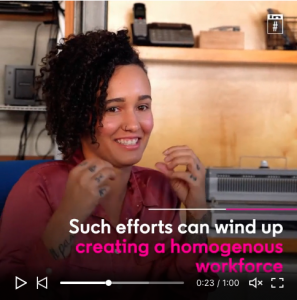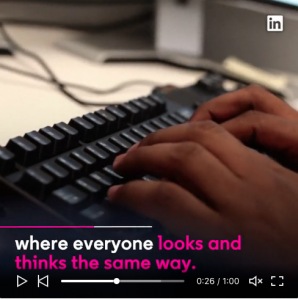This post is inspired by a topic that was trending on LinkedIn. The post asked about the practice of hiring for “culture fit”. Unfortunately LinkedIn doesn’t allow for sharing articles outside of LinkedIn, so I took screenshots of their main points.
The post was inspired by articles published by the Wall Street Journal and the Harvard Business Review. (Probably paywalled.)
- HBR – Hiring for Culture Fit Doesn’t Have to Undermine Diversity
- WSJ – The Dangers of Hiring for Cultural Fit
I have a lot of thoughts about the idea of “culture fit”, because rarely is culture so clearly defined in a company. I think most companies use it to discriminate and/or to try and get away with bad behavior.
Two Stories About “Cultural Fit”
There are 2 stories I think about when I hear about companies hiring for “culture fit”.
Story One: The Power of Diversity
A few years ago, I attended a one-day women-in-tech conference here in NYC. One of the speakers talked about her experience with diversity and joining a team with less than ideal experience.
I will never forget this talk because something she said was so relevant about why diversity is important. She said: if everyone is the same, it means they can all fail the same way.
As a new member of her company’s engineering team, she came in with a bit of a non-traditional background, which gave her a different perspective when approaching problem solving. In her example, she explained how she solved a critical error that all the other experienced team members failed to recognize because they all thought about the problem in the same way. Her value to the team was not her skill as a developer. Her value was her knowledge about their customers. It was that unique perspective that allowed her to view this critical problem differently and find a solution that everyone else missed.
Story Two: What is your culture?
The second story is my own experience from job hunting. A few years ago, I was on a call with a creative director and the CEO/President of a small e-commerce company selling men’s clothes. As I talked to them about the role and what they were looking for, they revealed that they’d spent a long time looking for the “right person” who could fit into their culture. When I asked them how long they’d been looking, they told me 8 months. (8 months!?)
When they told me that, I realized they didn’t know what they were looking for and all this time they’d come up with some type of excuse to eliminate candidates from their list. And I basically told them that it sounded like I was unlikely to get the job. I even asked them, what was special about their culture. They couldn’t articulate any details about their company culture that made them any more unique compared to any other company.
So what is culture anyway?
I love going to cultural events. It’s such a great way to learn about people and different parts of the world, without actually traveling and spending money on a trip. 🙂
Culture is the combination of art, language, food, dress, religion, music and social rules of a society. Here’s what Wikipedia has to say:
Culture is an umbrella term which encompasses the social behavior, and norms found in human societies, as well as the knowledge, beliefs, arts, laws, customs, capabilities and habits of the individuals in these groups.
Humans acquire culture through the learning processes of enculturation and socialization, which is shown by the diversity of cultures across societies.
A cultural norm codifies acceptable conduct in society; it serves as guideline for behavior, dress, language, and demeanor in a situation, which serves as a template for expectations in a social group. Accepting only a monoculture in a social group can bear risks, just as a single species can wither in the face of environmental change, for lack of functional responses to the change.
I think companies neglect the second paragraph: enculturation and socialization. Enculturation is the process by which people learn the dynamics of their surrounding culture. Socialization is the process of internalizing the norms and ideologies of society.
The first question to ask is whether a company is truly aware of their culture, and the second is if they have a plan to help new employees learn it. All companies have a culture, but do they recognize the elements of their culture enough to help new people learn them.
With so many companies cutting back on HR departments, I wonder how many of them have truly invested in the process of enculturation and socialization to help people learn and internalize the culture of their workplace. And have they considered how much time they’re willing to allow for assimilation to happen. My guess is too many employers are looking for exact matches, which makes no sense because the only way someone would have a company’s exact culture is if they already work there.
Is “cultural fit” just an excuse for bad behavior?
To be totally honest, when I hear people talk about “cultural fit”, what I think they really mean is:
- Will this person complain or push back at working nights and weekends?
- Is this person going to get offended at our sexist jokes?
- Can we drink in the office or have bottles of liquor on the desk?
- Can we swear like pirates at work?
- Can we get away without a true HR department?
Maybe in some cases, it’s Will this person turn us in for doing something illegal?
But I think what they’re really asking is: Is this someone we can control? To some extent, that’s a fair question. On the other hand, is anybody asking, controlling for what?
Same Words, Two Deliveries
I sometimes think companies try to squeeze the individuality out of their employees, so that they can all become the same type of person over time. For that, let me share an example from Shakespeare (aka culture).
In this video, two well-known actors discuss and act out their different portrayals of Shylock, the main character from Shakespeare’s play, The Merchant of Venice. The actors are Patrick Stewart, of Star Trek fame, and David Suchet, of Poirot fame — and also one episode of Doctor Who!
The scene is from, ACT I, SCENE III. Venice. A public place. The character Antonio has just asked for 3,000 ducats and Shylock contemplates.
Patrick Stewart VS David Suchet – Shylock – Merchant of Venice
Patrick Stewart VS David Suchet. Two brilliant interpretations of 'Shylock' from the 'Merchant of Venice'. Their analysis, followed by their performances. Which do you prefer??(acting begins at 8:00)
Posted by In The Moment on Sunday, August 6, 2017
What I love about this is that despite the words being exactly the same, the director gave them the freedom to express their own versions of the character. The video is under 12 minutes, so it doesn’t take long to view.
This example is kind of the embodiment of what I wish companies would really get about “cultural fit” and diversity. I really don’t think the question to ask is ‘Do you fit in?’ To me, that list is pretty short:
- be pleasant to be around
- be safe
- don’t do illegal stuff at work or on behalf of the company
You know, Girl Scout stuff.
What does this example show?
It shows a theater company that has hired two accomplished actors who can do the same role and speak the same exact words, yet their individual and diverse perspectives are what brings value to their performances. It also shows that the theater company, either at the same time or at different times, not only values the diversity of a heterogeneous theater troupe but they also recognize that their audience does too.
I hope that for-profit companies can also get to a place where they value that some of their employees will express the company culture differently than others, or express different aspects of the company culture at different times — and they’re OK with that. They’re still getting the job done, but the uniqueness each person brings to the job is still valued and ultimately will be a benefit to their company and their customers.
And just for fun, here’s Al Pacino doing the same scene:




